Your Cart is Empty
TALK TO AN EXPERT: Call, Text or Chat Mon-Friday 10AM-5PM CST [ 1-844-WILDOAK ]
Menu
-
- Berkey Water Filter Systems
- Portable Solar Generators
- Martin Propane Heaters
- Composting Toilets
- DIY Buildings & Kits
- Canvas Tents
- Homestead & Off Grid Supplies
- Harvest Right Freeze Dryers
- Emergency Food Kits
- Water Filter Systems
- Hunting Blinds
- Solar Air Conditioners
- Solar Fridge & Freezers
- Electric Coolers
- Overlanding Gear
- Two Person Cots
- Portable Saunas
- Incinerating Toilets
- BeeKeeping
- Poultry Processing
- Dairy Equipment
- Coolers
- Faraday Defense
- EMP Shield
- Propane Wall Heaters
- Hunting Blinds
- Compost Tumblers
- Drip Irrigation Kits
- Shade Cloth
- Brands
- Chicken Coop Brands
- Composting Toilet Brands
- Solar Brands
- Food Storage Brands
- Freeze Dryer Brands
- Water Filtration Brands
- Incinerating Toilet
- Dry Flush Toilet Brands
- Waterless Toilet Brands
- Heater Brands
- EMP Shield Brands
- Tent Brands
- Cot Brands
- Cooler Brands
- Stove & Grill Brands
- Dog Kennels
- Greenhouse & Gazebo Brands
- Portable Saunas
- DIY Shed Kits
- About Us
- Resource Center
- The Ultimate Prepper & Emergency Survival Blog - Includes Free eBook
- Beginners Guide to Living off The Grid - Includes Free eBook
- Building Your Own Emergency Food Supply
- Best Survival Food to Be Prepared for Anything
- Berkey Lab Tests & Certifications
- Federal Solar Tax Credit - What You Need to Know
- BLOG
-
- 1-844-945-3625
- Login

TALK TO AN EXPERT: Call, Text or Chat Mon-Friday 10AM-5PM CST [ 1-844-WILDOAK ]
Maximize Sustainability: Explore the Benefits of Composting Toilets for Off-Grid Living
Embracing the off-grid ethos means finding innovative solutions for everyday needs. For waste management, composting toilets are a standout choice. But what makes them ideal for such a lifestyle? This article highlights the most significant benefits of composting toilets for off-grid living, explaining how they contribute to water savings, waste minimization, and greater independence from public utilities—all while nurturing the environment.
Key Takeaways
-
Composting toilets offer an eco-friendly waste solution for off-grid living, conserving water and turning waste into nutrient-rich compost instead of relying on traditional plumbing.
-
Models like Nature’s Head, BioLet, and Sun-Mar Excel lead the way in composting tech, providing options for different needs—whether you’re in a tiny home or managing waste for a larger community.
-
Adopting composting toilets requires understanding the maintenance and legal aspects, but they can bring long-term savings and reduce environmental impact significantly.
Why Choose Composting Toilets for Off-Grid Living?
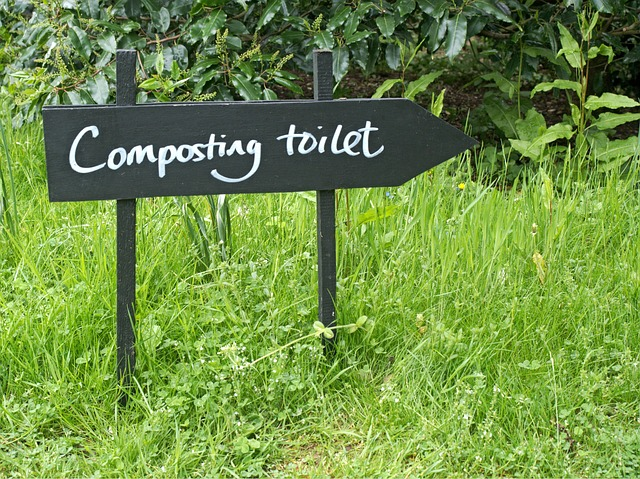
Ever paused to ponder the sheer genius of nature’s cycle of renewal? Composting toilets are the embodiment of this brilliance, turning what we discard into a resource that gives back to the earth. These eco-friendly champions of the bathroom world leverage natural biological processes to break down waste, seamlessly aligning with the ethos of sustainable living. They are the go-to waste management solution for off-grid habitats where traditional plumbing is a no-go and water is a treasured commodity.
While traditional flush toilets are a thirsty beast, guzzling gallons with every flush, composting toilets are the waterless wonders of waste disposal. They’re not just for the rustic cabin in the woods either; a growing contingent of conventional homeowners are turning to these eco-friendly alternatives, propelled by water scarcity and an increasing desire for a greener lifestyle. For those residing in remote areas or simply striving to lessen their environmental footprint, composting toilets present a feasible and eco-friendly option for waste management.
The top three composting toilets
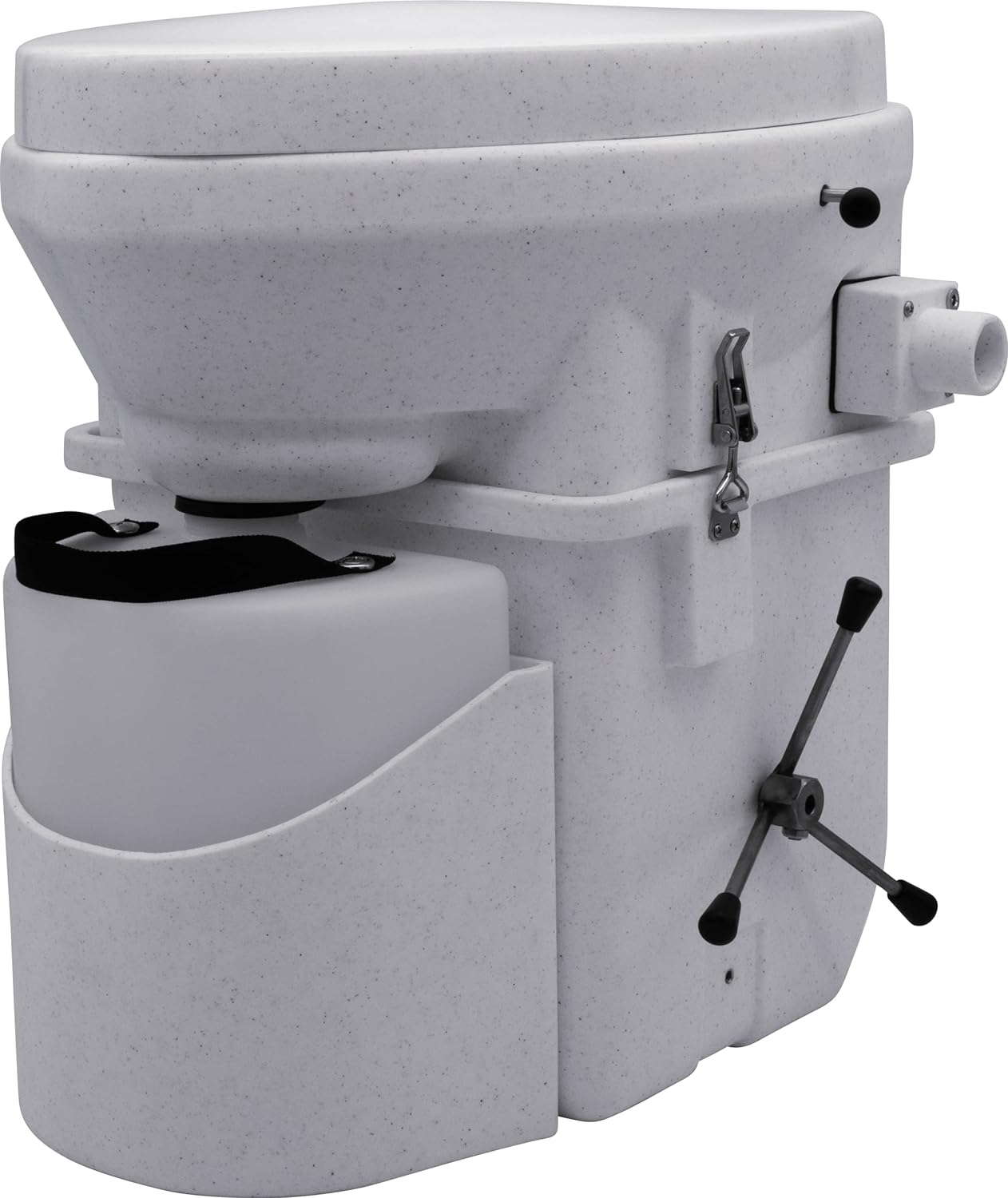
Within the sphere of off-grid sanitation, three composting toilets emerge as leaders: Nature’s Head, BioLet, and Sun-Mar Excel. These stellar models have redefined the composting toilet landscape, offering a blend of convenience, efficiency, and environmental stewardship.
Beyond adeptly tackling waste management, these models promote water conservation, waste reduction, and self-sufficiency—the pillars of sustainable living.
Water Conservation
One of the most compelling arguments for adopting a composting toilet is the staggering amount of water it saves. Picture this: over 6600 gallons of water conserved per person each year, just by saying goodbye to the flush toilet. This isn’t a drop in the bucket; it’s a deluge of savings, significantly cutting down household water consumption and the environmental impact of our most intimate daily routines.
Waterless composting toilets are the unsung heroes of water conservation, turning waste management into a dry affair with their waterless design.
Waste Reduction
But it’s not just about saving water; it’s about transforming waste into a treasure trove of nutrients. Composting toilets are the alchemists of the waste world, converting what we leave behind into nutrient-rich compost, ripe for nourishing gardens and supporting a closed-loop system. They alleviate the strain on sewage systems and the environment, reclaim valuable nutrients like nitrogen and phosphorus, and reduce our reliance on chemical fertilizers.
The final result of the composting process is nutrient-rich compost that enhances soil health and perpetuates a sustainable waste management cycle.
Self-Sufficiency
Self-sufficiency is the crown jewel of off-grid living, and composting toilets are the throne upon which it sits. These ingenious systems allow you to:
-
Manage waste on-site without the need for external plumbing or sewer connections
-
Reduce water usage
-
Offer a complete alternative for waste treatment
-
Improve soil fertility with the resulting compost
Composting toilets are a great option for those looking to live off-grid and minimize their environmental impact, serving as an efficient off grid toilet system.
Types of Composting Toilets for Off-Grid Living
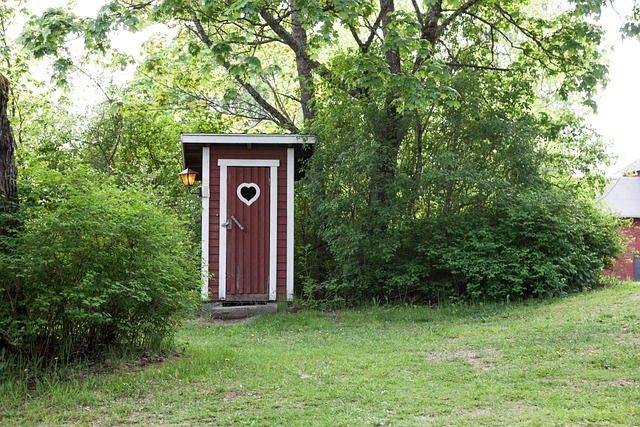
When choosing a composting toilet, the options are as varied as the landscapes they inhabit. There are self-contained units, central systems, and portable options, each with unique features and benefits tailored to different off-grid scenarios. Whether you’re flying solo in a tiny house or helming a communal retreat, there’s a composting solution designed to meet your needs.
Self-Contained Units
Compact and convenient, self-contained composting toilets are the quintessential choice for small spaces and single-toilet households. With their all-in-one design, including a composting chamber and a toilet seat, and odor-free operation, these units shine in off-grid settings like tiny homes and RVs, making them the perfect portable composting toilet solution.
Their incorporated fans and ventilation systems maintain fresh air, while their capacity to convert waste into compost without a black tank benefits both budget and garden.
Central Systems
For those with larger homesteads or shared facilities, central composting toilet systems offer an efficient way to manage waste from multiple fixtures as an alternative to a septic system or a septic tank. These systems are often tucked away beneath the bathroom floor or in a remote area, marrying aesthetics with sanitation.
Their capacity to handle high volumes makes them a favorite for places like campgrounds and public venues.
Portable Options
Then there are the nomads, the adventurers, the weekend warriors—those who need a sanitation solution that’s as mobile as they are. Portable composting toilets answer this call with their lightweight designs and advanced features. They make it possible to maintain sanitary conditions in a variety of off-grid settings, including:
-
Boats
-
Backcountry campsites
-
RVs
-
Tiny homes
All while adhering to environmentally responsible practices.
Installation and Maintenance of Composting Toilets
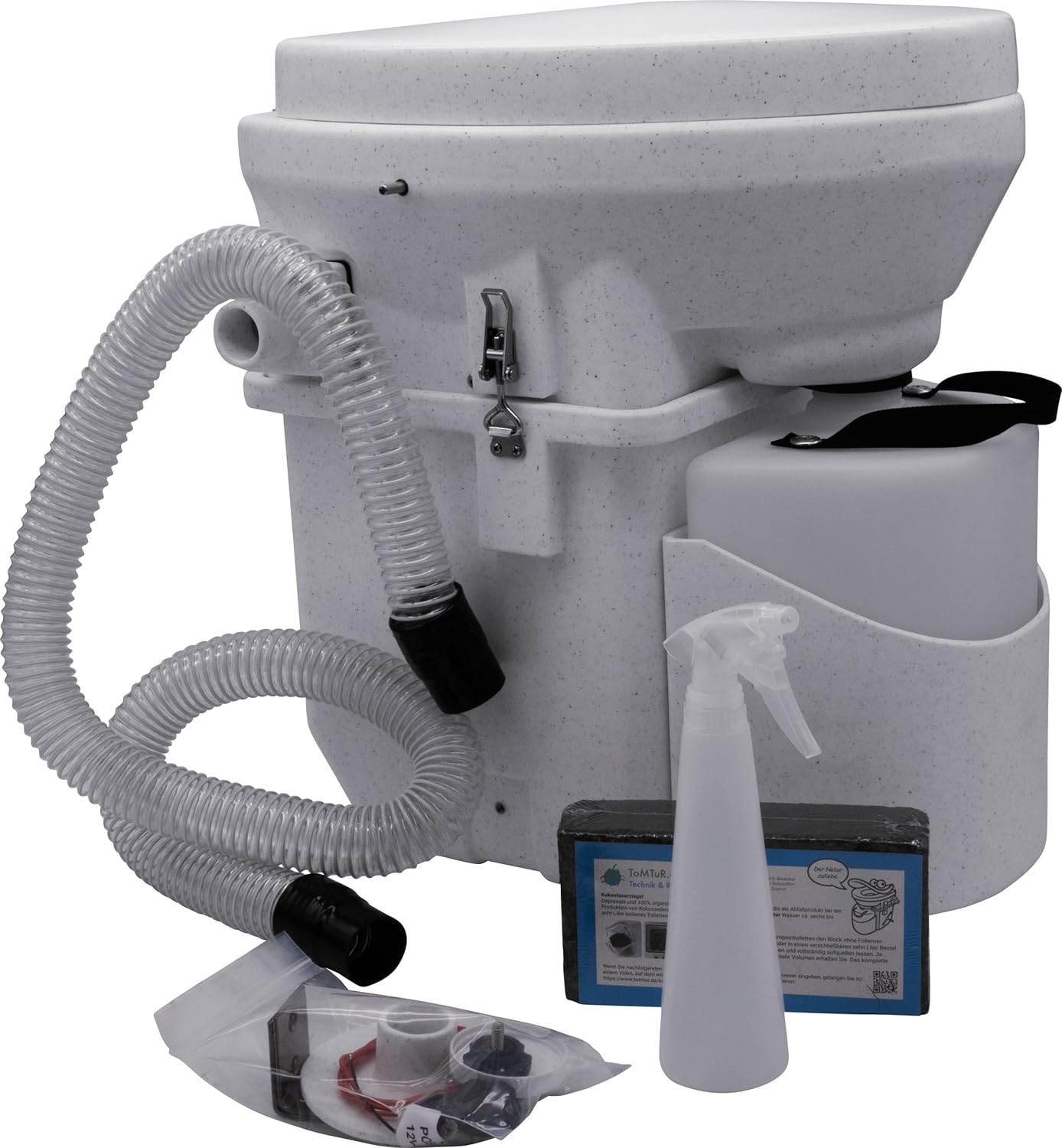
The quest for an off-grid lifestyle extends beyond merely choosing the appropriate composting toilet; it’s only the start. Installation and maintenance are the keystones to ensuring your toilet operates efficiently and remains odor-free. With straightforward DIY installation and regular upkeep, composting toilets become a hassle-free part of your sustainable lifestyle.
Proper Ventilation
Ventilation is the secret to a successful composting toilet. It’s what keeps the air moving, the compost aerated, and the odors at bay. Modern composting toilets come equipped with fans and sometimes heating elements, all working together to provide an odorless experience.
Keep in mind, maintaining good ventilation in a composting toilet is essential, and routine fan inspections are part of the process.
Regular Maintenance
Like any well-oiled machine, a composting toilet requires regular maintenance to perform at its best. This includes everything from:
-
Weekly cleaning
-
Adding bulking agents
-
Avoiding harsh chemicals
-
Annual fan blade dust-offs
-
Adhering to a maintenance schedule
Following these steps will ensure your compost remains healthy and your toilet remains a low-maintenance feature of your off-grid home.
Troubleshooting Common Issues
Even the most diligent composting toilet owner may encounter an issue or two, but fear not—solutions are at hand. Here are some common problems and their solutions:
-
Unpleasant odors? Check the ventilation.
-
Excessive moisture? Add more carbon-rich materials like Coco Coir.
-
Insects or rodents? Seal up and secure. This can be accomplished by putting mesh or screen material over your outdoor vent.
-
If you don’t have an automatic mixer, get in there with a tool and give it a good turn. Units like the Nature's Head Composting Toilet have a built in agitator.
Financial and Environmental Benefits of Composting Toilets
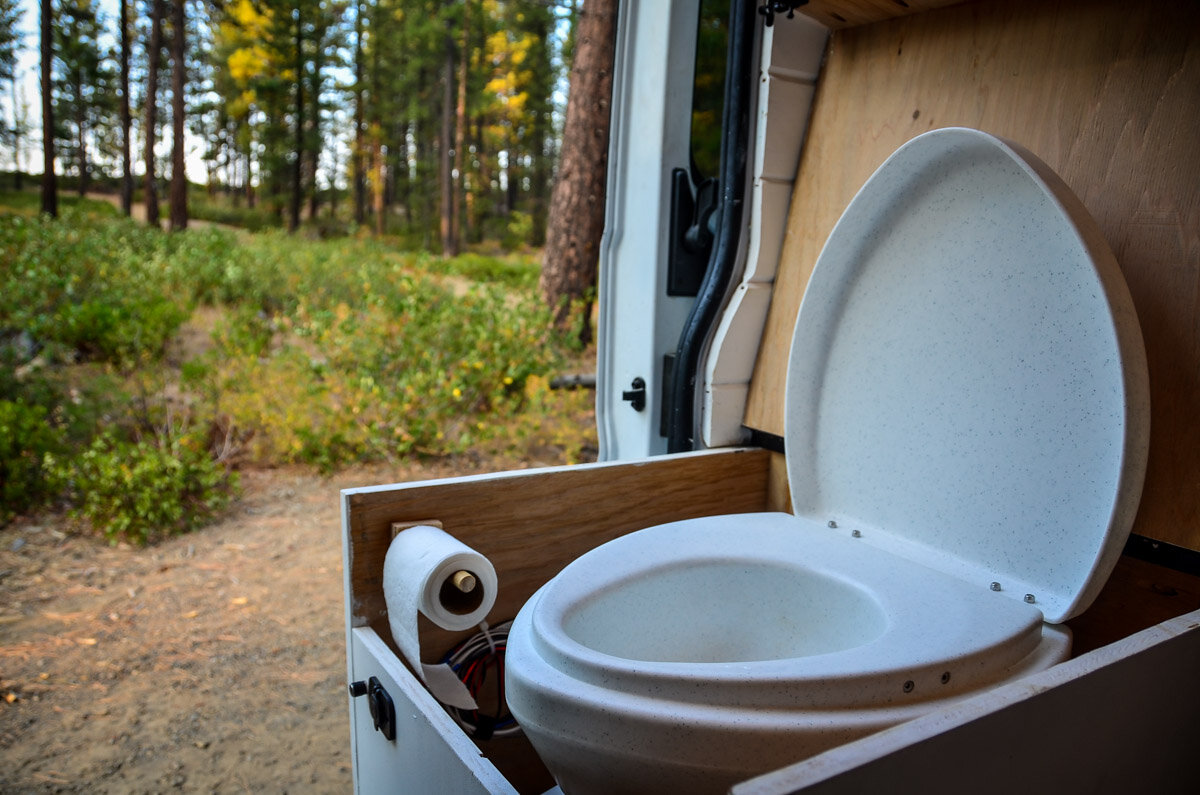
The allure of composting toilets isn’t just in their eco-friendliness; it’s in the financial and environmental rewards they reap. From reducing water bills to minimizing your carbon footprint, these toilets are a sensible investment for both your wallet and the world.
Reduced Water Bills
Considering the numbers, composting toilets can drastically reduce your water bills due to their water-free operation. By eliminating the flush, you’re not only saving resources but potentially pocketing rebates from your utility provider. It’s a financial win with a conservation cherry on top.
Lower Environmental Impact
The ecological advantages provided by composting toilets are incredibly noteworthy. They allow for the sustainable reuse of human waste, reducing the demand on sewage plants and preventing groundwater pollution.
With composting toilets, you’re not just disposing of waste; you’re giving back to the earth in the most natural way possible.
Return on Investment
In the long run, the initial investment in a composting toilet is dwarfed by the savings it yields. Reduced water and sewage bills, minimal repair expenses, and the elimination of conventional plumbing add up to substantial long-term savings. The ongoing costs are minimal, often limited to the occasional purchase of composting additives.
Legal Considerations and Local Regulations
Like any home modification or lifestyle alteration, composting toilets have their own legal aspects and local rules to consider. Whether it’s permit requirements or waste disposal guidelines, staying informed and compliant is key to hassle-free composting toilet ownership.
Permit Requirements
Before installing a composting toilet, especially a central system, you may need to navigate the world of permits and local regulations. Local building inspectors have a say in what’s considered ‘approved,’ and legal sanitation requirements can dictate the feasibility of your composting toilet project.
Waste Disposal Guidelines
Disposing of waste from your composting toilet requires adherence to guidelines that ensure safety and environmental integrity. Here are some steps to follow when dealing with liquid and solid waste:
-
Dry, securely bag the solid waste.
-
Check local regulations to determine if it can be accepted in public trash.
-
Handle the waste with care to avoid bacterial risks.
By following these steps, you can properly dispose of waste from your composting toilet.
And while burying composted material can benefit non-edible plants, it’s best done with consideration for local laws and the environment.
Real-Life Examples of Off-Grid Living with Composting Toilets
Observing composting toilets in actual off-grid living scenarios powerfully attests to their worth. From adventurers abiding by the ‘Leave No Trace’ principle to eco-conscious homeowners, these toilets are making a tangible difference in the way we view and manage human waste.
Summary
As we wrap up our exploration into the world of composting toilets, it’s clear that these systems are not just a niche choice for the eco-warrior but a viable, responsible, and financially savvy option for anyone looking to live off-grid or simply reduce their environmental footprint. With the knowledge shared here, you’re now equipped to make informed decisions that benefit both your lifestyle and the planet.
Frequently Asked Questions
What are the benefits of a composting toilet?
Composting toilets offer water conservation, chemical-free operation, cost savings, and environmental stewardship. They reduce water use and recycle plant nutrients, contributing to overall sustainability.
What are the drawbacks of a composting toilet?
Composting toilets require increased maintenance and manual upkeep, as neglecting maintenance can lead to terrible odors, messes, and health hazards. Be sure to stay on top of the maintenance to avoid these drawbacks.
How does a composting toilet work off grid?
So, basically, a composting toilet separates liquids and solids to prevent odors, and you add a carbon-rich cover material like sawdust after each use to aid in the decomposition process. Easy, right?
What is the best toilet option for off grid?
The best off-grid toilet option would be a composting toilet, as it treats human waste through a biological process and is less gross than other options like a bucket or long drop, while being less expensive and complex to install.
Can I install a composting toilet in any type of home or do I need a special setup?
Yes, you can install a composting toilet in a variety of home settings, as long as you have the correct ventilation and space for the unit and comply with local regulations. So, whether you live in a traditional house, tiny home, or RV, it's possible to make it work.
Cherry May
Cherry May, the heart of Wild Oak Trail as the Store Manager, brings an unmatched dedication to customer service enriched by six years of hands-on experience and learning. Her journey with Wild Oak Trail has seen her evolve into a cornerstone of the community, renowned for her expertise in off-grid living, solar generators, and comprehensive prepping. Customers and colleagues alike applaud her for an impeccable service ethos, effortlessly blending profound knowledge with a genuine commitment to meeting every individual's needs.
Leave a comment
Comments will be approved before showing up.
